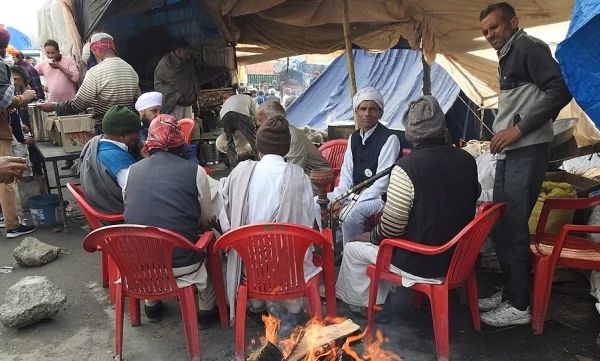Geert Cool is a member of Linkse Socialistiche Partij / Parti Socialiste de Lutte (ISA in Belgium).
India’s Supreme Court has decided to suspend the BJP government’s contested agriculture laws. This is an expression of the enormous social pressure to reverse the liberalisation of agriculture. The farmers however are not fooled: suspension is not enough, the laws must go completely.
Farmers started their protest after the government passed several laws liberalising agriculture in September. The protest is well organised and has already lasted for months. There are occupations, including at the entry roads to Delhi after the entrance to the capital itself was repressively blocked. The inspiration of the farmers’ protest strengthened the momentum for the general strike of November 26 in which 250 million workers participated despite Covid-19 restrictions. Support for the farmers’ protest has continued to grow in recent weeks. Even the peasant wing of the RSS, the Hindu nationalist militias which exercise a lot of control over the BJP, was compelled to support the anti-government protest. In Madhya Pradesh, the Bharatiya Kisan Sangh (BKS), which is affiliated to the RSS, held its own farmers’ protest with 10,000 people in attendance.
The Supreme Court decision came after several petitions. The decision increases the pressure on the ruling BJP. It is only a temporary suspension until a group of four experts finds a “solution” to the ongoing conflict through mediation. It emphasises the lack of consultation in passing the laws. The BJP argues that it has been negotiating sufficiently with the farmers’ organisations and that the laws are the result of two decades of preparation. The farmers’ organisations, for their part, continue their protest. A big tractor parade is planned on January 26, the national holiday. It is important to continue protesting and not to rely on experts appointed by a politically appointed court. The farmers’ organisations rightly noted that the four experts had previously spoken out in favour of the agricultural laws.
The farmers’ strongest weapons are their own determination and the wider support they enjoy among the population. Their determination is reflected in the protests that have been going on for weeks, including in Delhi where the cold winter and rain have already caused dozens of deaths. Support is evident from the expansion of the farmers’ protest across the country and the sympathy among working people. The stakes of the struggle are understood: even outside agriculture, the consequences of liberalisation and market opening are being felt. Companies like Amazon are booming and now Tesla too wants to establish itself in India. The BJP government is pursuing a policy of privatising and deregulating the labour market, making India even more interesting for the bosses of both local and international companies. A small top layer in India is reaping the benefits: by the end of 2020, the club of dollar billionaires had grown by ten to 90 people, with a combined wealth of $483 billion or 33% more than a year earlier.
To stop the farmers’ protest, the government has given in to some minor demands. However, the central element of the abolition of regulated sales and associated minimum prices for agricultural products remains. The government denies that minimum prices are affected, but the farmers rightly claim that liberalisation of the market will also lead to the end of this protection. The problem is not so much a lack of consultation, but rather along which lines negotiations are possible. For the BJP the negotiations must lead to acceptance of the liberalisation policy that has been effectively prepared and implemented for 20 years. For the farmers this is not possible: it clashes with their elementary demand for a decent income and corresponding respect for their hard work.
Government attempts to create divisions, including on the basis of the national question, do not work as long as the farmers’ protest continues on the offensive. To achieve victory, a front of farmers and workers is necessary. What are the trade unions waiting for to support their brothers and sisters in the countryside with strike action? A repeal of the agricultural laws would put the workers’ movement in a much stronger position to resist the attacks on their conditions and living standards.
The four Supreme Court experts announced that they will submit a report within two months. Until then, the issue may be deadlocked. At the same time, the farmers are showing that they are capable of sustaining their movement over a longer period of time. The day of action on January 26 will not be an end point. A call for mass actions on January 26 coupled with a call for new strikes around the demands of both workers and farmers can strengthen the movement. Joint action committees of workers and farmers can coordinate the struggle. Such coordination is also needed to develop a platform of demands and approach that stops not only the current attacks on farmers and workers, but the entire policy of the past decades.
Against the backdrop of a terrible health crisis and a sputtering economy, for which the outlook is not good, the BJP government will play the card of Hindu chauvinism and division even more. Its anti-social policies and nationalism go hand in hand. As author Arundhati Roy noted in her latest book Azadi, “Neoliberal economic evangelists and Hindu nationalists had ridden into town on the same horse – a flaming saffron steed whose dapples were really dollar signs.” The best way to overcome the divisions propagated by the Hindu nationalists is through unified action by workers and peasants in the various states of India.
This struggle goes against what capitalism has to offer the Indian peasants and workers. We need an alternative to this system, a socialist society based on the needs of the majority of the population and using the available resources in a democratically planned way. To obtain that alternative, we have to fight and organise ourselves now!



